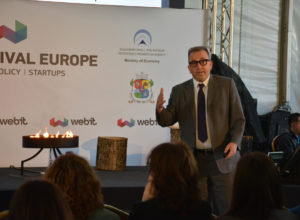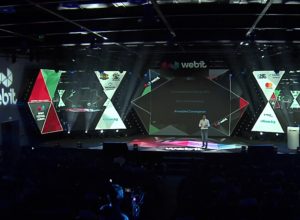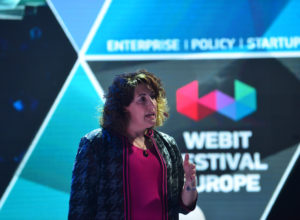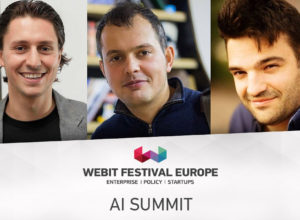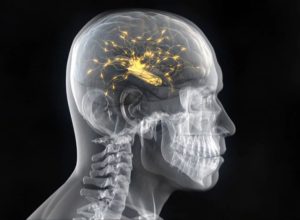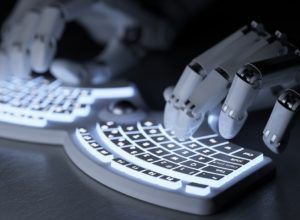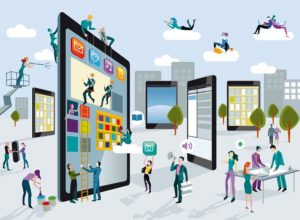Tag: ai
The need for ethical practices in AI
Nowadays, we have access to two things. First, a big amount of data about our personal information and second - access to AI which enables us to understand far better the insights that make us who we are.
At the 2017 edition of Webit.Festival Europe the President and Global Brand Director of Havas Worldwide Jason Jercinovic, introduced the topic of ethics in the Artificial Intelligence because if this data is in the wrong hands, our privacy could be endangered.
An ethical imperative on how to use this data is necessary to be created. We should consider ethics from the perspective of both consumers and professionals to communicate in an informed way while considering the benefits and the risks which AI brings.
Jason Jercinovic stressed on the development of the tools of today which compared to those of the past can recognize unstructured data. The truth is the world of social media and interconnected devices is one of unstructured data. And these tools enable us to understand the insights from that unstructured data at a scale and to work with them.
[caption id="attachment_5137" align="aligncenter" width="640"]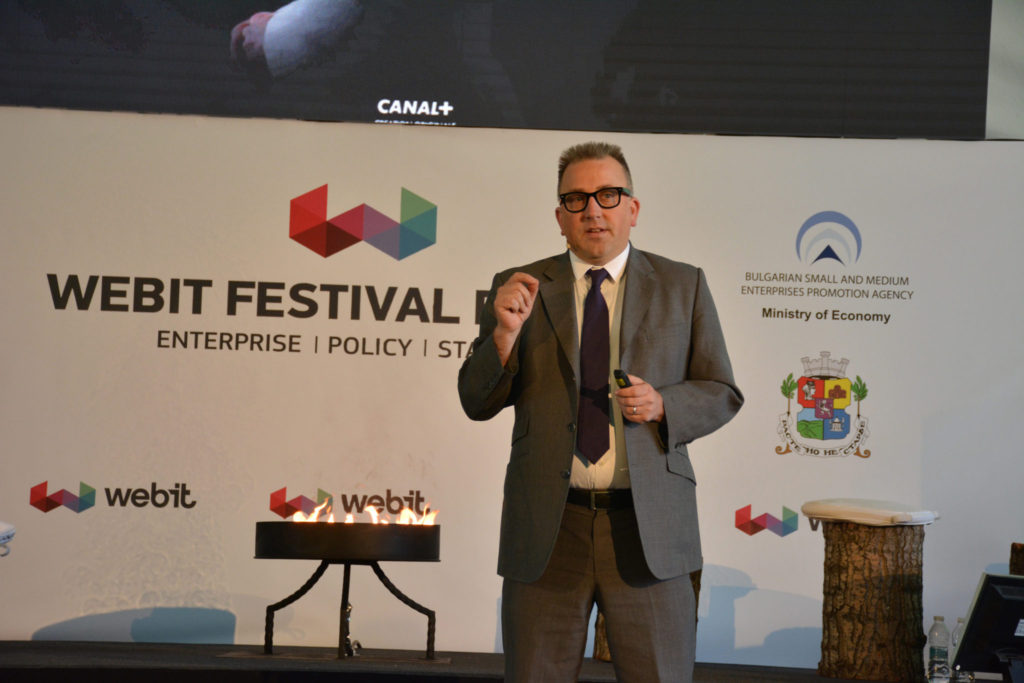 The President and Global Brand Director of Havas Worldwide Jason Jercinovic[/caption]
The vast amount of data enables us to understand people’s behaviour in great detail. Furthermore, it allows us to create and deliver experiences which are extremely efficient since they are targeted to each individual based on personal preferences.
The President and Global Brand Director of Havas Worldwide Jason Jercinovic[/caption]
The vast amount of data enables us to understand people’s behaviour in great detail. Furthermore, it allows us to create and deliver experiences which are extremely efficient since they are targeted to each individual based on personal preferences.
 The President and Global Brand Director of Havas Worldwide Jason Jercinovic[/caption]
The vast amount of data enables us to understand people’s behaviour in great detail. Furthermore, it allows us to create and deliver experiences which are extremely efficient since they are targeted to each individual based on personal preferences.
The President and Global Brand Director of Havas Worldwide Jason Jercinovic[/caption]
The vast amount of data enables us to understand people’s behaviour in great detail. Furthermore, it allows us to create and deliver experiences which are extremely efficient since they are targeted to each individual based on personal preferences.
“With that information I can predict the future. I can influence how you think.”, Jercinovic said.This technology is becoming more complex at a very fast pace. The reality is that companies are willing to use our personal information in order to target their products or services more precisely. Whether we accept this approach as ethical or not will not change the current situation. That is why, we need a code of conduct. At the end of his talk, Jason Jercinovic underlined once again the importance of making a difference between the benefits and the risks AI brings. It is no secret that this technology is used by companies to deliver high quality content and products to us, customers. AI is present in most parts of our live and it is here to make it better. To get a real idea of how AI is implemented in our daily life you can find more about eagleAi, an intelligence platform created by Havas Cognitive for ITV News. It aims to understand how consumers think and it was used during the USA elections. eagleAi processes a huge amount of posts, comments, tweets, news articles, debates and many more to determine what people are talking about and which issues they do find relevant. AiMEN is a cognitive social listening tool created by Havas Cognitive which with the help of AI discovers the posts of people who leave negative comments on the Internet and responds to them with quotes from the Bible. You can watch his full lecture here: If you want to keep up with the latest trends in the world of digital economy and technology, then Webit.Festival is the right place for you. Visit our website and book 2 in 1 of our Super Earlybird tickets for Webit.Festival Europe 2018. Feel the Webit vibe with some of the best photos from this year’s event! [easingslider id="4954"]
The symbiosis between humans and machines is our best hope for...
When we are looking towards the future, we usually think about Artificial Intelligence as something that will bring us autonomous vehicles, clean and safe environment and healthy and extended life. Everything we have envisioned is connected to the AI.
But most of us still don’t realize how this amazing technology will be able to change our lives for the better and connect us in a way we didn’t think was possible.
During Webit.Festival Europe the Partner at IBM Ventures Christoph Auer-Welsbach shared his experience in this emerging field and explained why AI in its essence is a converging technology and enabler of the full human potential.
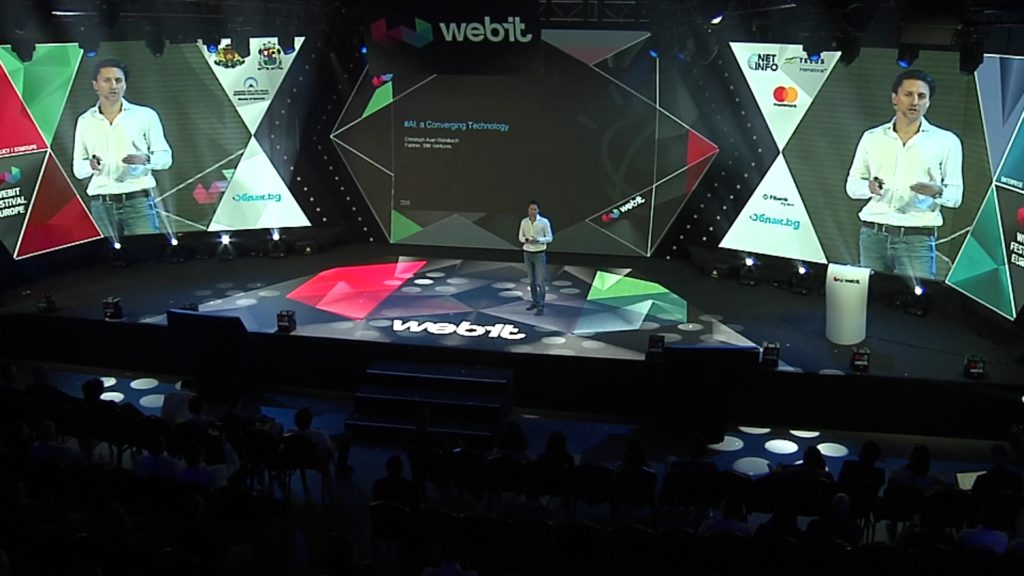 The Partner at IBM Ventures Christoph Auer-Welsbach.[/caption]
Christoph Auer-Welsbach predicts that there are 3 paradigms that are going to shape our communication with AI enabled computers in the near future.
The first is that enterprise applications and all the major IT organizations in the world will make use of any kind of conversation methodology, bot or automating systems, in the next couple of years. So our whole way of interacting with machines is going to change from input-driven to engagement and conversation-driven.
The second paradigm AI is pushing is mass individualization. Now we are living in a world where applications and solutions are built to satisfy the most common and homogenous group of people and reach them. The mass standardization we can see now is changing to mass personalization in a way that not only from a customer service view, but also from a product development and engagement point of view machines will be very much personalized on a person’s behavior, demand and attitude.
The third is that we are moving to the world of AI-enabled Convergence. It enables other technologies to flourish and get into the system contextual information and act proactively and not from a passive response point of view.
Artificial Intelligence is still in its infancy. That is why we need to be active and have the curiosity to understand what it is. It is important for every person on Earth to check the latest trends in this technology and understand how it could impact our personal and business life.
The Partner at IBM Ventures Christoph Auer-Welsbach.[/caption]
Christoph Auer-Welsbach predicts that there are 3 paradigms that are going to shape our communication with AI enabled computers in the near future.
The first is that enterprise applications and all the major IT organizations in the world will make use of any kind of conversation methodology, bot or automating systems, in the next couple of years. So our whole way of interacting with machines is going to change from input-driven to engagement and conversation-driven.
The second paradigm AI is pushing is mass individualization. Now we are living in a world where applications and solutions are built to satisfy the most common and homogenous group of people and reach them. The mass standardization we can see now is changing to mass personalization in a way that not only from a customer service view, but also from a product development and engagement point of view machines will be very much personalized on a person’s behavior, demand and attitude.
The third is that we are moving to the world of AI-enabled Convergence. It enables other technologies to flourish and get into the system contextual information and act proactively and not from a passive response point of view.
Artificial Intelligence is still in its infancy. That is why we need to be active and have the curiosity to understand what it is. It is important for every person on Earth to check the latest trends in this technology and understand how it could impact our personal and business life.
“We now use AI in situations where we didn’t have any solution yet - where technology is not capable of achieving specific results. We are putting a lot of efforts, time and resources to get there. What we have proved already is that we can solve complex, but narrow problems”, he said.The first demonstration of a machine that was capable of solving a complex problem was in 1997 when IBM’s Deep Blue defeated Garry Kasparov in chess. Roughly 15 years later a team in IBM Research had the goal to understand natural human language. The public demonstration was to defeat a human at the show Jeopardy and this was accomplished. Another thing that happened last year was Alpha Go from Google DeepMind defeating Lee Sedol in the boardgame Go and also succeeding to solve a very complex problem in a very narrow domain. And just recently a team from Carnegie Mellon University succeeded in developing a smart machine that has defeated world class poker players in Texas Hold ‘Em because it can already understand and deal with incomplete information. This all means that the future goes into the direction where AI will be used for negotiation processes, strategy development and even high level policy analytics.
“When you go to your car dealer in the future you may have a small application on your device that helps you negotiate the best possible deal”, Auer-Welsbach said.The biggest issue before the AI today is understanding humans and language. The machines understand natural text as data, not as text. This is a problem, because they are missing the context, which is necessary in order to really make use of all the data. In a recent attempt IBM broke industry record in conversation speech recognition by getting it down to 5.5%. This is important because the human error is at 5.1% which means that we are very close to understanding the natural human language from a machine perspective. This new ability can be used to build transformative relationships between humans and machines. [caption id="attachment_5072" align="aligncenter" width="640"]
 The Partner at IBM Ventures Christoph Auer-Welsbach.[/caption]
Christoph Auer-Welsbach predicts that there are 3 paradigms that are going to shape our communication with AI enabled computers in the near future.
The first is that enterprise applications and all the major IT organizations in the world will make use of any kind of conversation methodology, bot or automating systems, in the next couple of years. So our whole way of interacting with machines is going to change from input-driven to engagement and conversation-driven.
The second paradigm AI is pushing is mass individualization. Now we are living in a world where applications and solutions are built to satisfy the most common and homogenous group of people and reach them. The mass standardization we can see now is changing to mass personalization in a way that not only from a customer service view, but also from a product development and engagement point of view machines will be very much personalized on a person’s behavior, demand and attitude.
The third is that we are moving to the world of AI-enabled Convergence. It enables other technologies to flourish and get into the system contextual information and act proactively and not from a passive response point of view.
Artificial Intelligence is still in its infancy. That is why we need to be active and have the curiosity to understand what it is. It is important for every person on Earth to check the latest trends in this technology and understand how it could impact our personal and business life.
The Partner at IBM Ventures Christoph Auer-Welsbach.[/caption]
Christoph Auer-Welsbach predicts that there are 3 paradigms that are going to shape our communication with AI enabled computers in the near future.
The first is that enterprise applications and all the major IT organizations in the world will make use of any kind of conversation methodology, bot or automating systems, in the next couple of years. So our whole way of interacting with machines is going to change from input-driven to engagement and conversation-driven.
The second paradigm AI is pushing is mass individualization. Now we are living in a world where applications and solutions are built to satisfy the most common and homogenous group of people and reach them. The mass standardization we can see now is changing to mass personalization in a way that not only from a customer service view, but also from a product development and engagement point of view machines will be very much personalized on a person’s behavior, demand and attitude.
The third is that we are moving to the world of AI-enabled Convergence. It enables other technologies to flourish and get into the system contextual information and act proactively and not from a passive response point of view.
Artificial Intelligence is still in its infancy. That is why we need to be active and have the curiosity to understand what it is. It is important for every person on Earth to check the latest trends in this technology and understand how it could impact our personal and business life.
“The symbiosis between humans and machines is the most capable way of making use of technology and moving forward into the future. Because we can enhance each other’s capabilities. On the one hand we have human’s capabilities like compassion, intuition and value judgement and on the other we have the learning, discovery and fact checking that machines excel at”, the expert said.You may watch Christoph Auer-Welsbach’s full lecture here: If you want to keep up with the latest trend in the world of digital economy and technology, then Webit.Festival is the right place for you. Visit our website and book 2 of our Super Earlybird tickets for Webit.Festival Europe 2018 for just €100. Feel the Webit vibe with some of the best photos from this year’s event! [easingslider id="4954"]
Big Data will lead to the biggest transformation in healthcare we...
In 1950’s it was estimated that the medical literature doubled every 50 years. By 1980 it was doubling every 3.5 years and by 2020 it will double every 73 days!
More than 8000 new medical articles come out every day. This makes impossible for clinicians to keep up with such volume of data. The information out there is unstructured and is coming in different forms and from different sources.
The only way our medical specialists can cope with the digital reality is with the help of artificial intelligence. During Webit.Festival Europe the Deputy Chief Health Officer for IBM Watson Health Dr. Lisa Latts explained how the latest technological advancements in this field will transform the world of healthcare in the next decades.
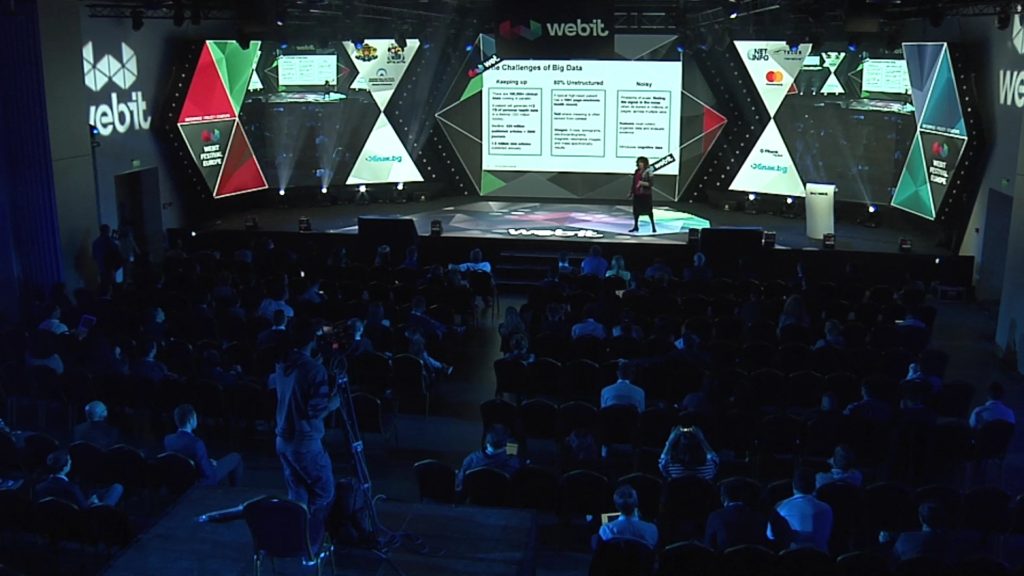 The Deputy Chief Health Officer for IBM Watson Health Dr. Lisa Latts[/caption]
We are now in in the Third age of computer technology. The first age in the early 1900’s was the Tabulating systems era - computers that basically can do math and count. Then in the 1950’s we started with Programmable computers and we are still in that age today where we have computes that we can give a variety of information and tell them what to do with it.
There is so much information available now that it is impossible to program all the characteristics and all the possible programs. So that brings us to the Cognitive computers era. IBM Watson started to work on this in the early 2000’s and 15 years after that was the official launch of Watson Health.
A cognitive computer is different from programmable computer, because it can understand, reason, learn and interact. All of this allows Watson to harness entire bodies of data. It can actually read through the data it is fed to it.
The Deputy Chief Health Officer for IBM Watson Health Dr. Lisa Latts[/caption]
We are now in in the Third age of computer technology. The first age in the early 1900’s was the Tabulating systems era - computers that basically can do math and count. Then in the 1950’s we started with Programmable computers and we are still in that age today where we have computes that we can give a variety of information and tell them what to do with it.
There is so much information available now that it is impossible to program all the characteristics and all the possible programs. So that brings us to the Cognitive computers era. IBM Watson started to work on this in the early 2000’s and 15 years after that was the official launch of Watson Health.
A cognitive computer is different from programmable computer, because it can understand, reason, learn and interact. All of this allows Watson to harness entire bodies of data. It can actually read through the data it is fed to it.
“We have made a lot of advancements in medical technology. Imagine the advancements we could have made if instead of just a fraction of data, we were able to access the entire lexicon of data that is available for an individual. Think what we could do and think of the price of not knowing”, she said.Now, many patients are not able to get the right cancer treatment, because doctors don’t know the exact characteristics of the individual tumor. People with chronic diseases don’t have access to the right medicine, because their doctors don’t have their full medical history. All of these cases are going to change with the help of Big Data. But first, experts, like the ones working in IBM, must deal with several challenges. There are a lot of bad sources of data out there, so you need to be able to separate the true from false. Doctors have got data from medical records, laboratory data, medical literature, radiology data. So they need to be able to aggregate all those forms of information to get a complete picture of what is going on with an individual. If we combine all these we will start to get to the true value of the data and start to really do things with it in terms of what we are delivering to an individual patient. [caption id="attachment_5068" align="aligncenter" width="640"]
 The Deputy Chief Health Officer for IBM Watson Health Dr. Lisa Latts[/caption]
We are now in in the Third age of computer technology. The first age in the early 1900’s was the Tabulating systems era - computers that basically can do math and count. Then in the 1950’s we started with Programmable computers and we are still in that age today where we have computes that we can give a variety of information and tell them what to do with it.
There is so much information available now that it is impossible to program all the characteristics and all the possible programs. So that brings us to the Cognitive computers era. IBM Watson started to work on this in the early 2000’s and 15 years after that was the official launch of Watson Health.
A cognitive computer is different from programmable computer, because it can understand, reason, learn and interact. All of this allows Watson to harness entire bodies of data. It can actually read through the data it is fed to it.
The Deputy Chief Health Officer for IBM Watson Health Dr. Lisa Latts[/caption]
We are now in in the Third age of computer technology. The first age in the early 1900’s was the Tabulating systems era - computers that basically can do math and count. Then in the 1950’s we started with Programmable computers and we are still in that age today where we have computes that we can give a variety of information and tell them what to do with it.
There is so much information available now that it is impossible to program all the characteristics and all the possible programs. So that brings us to the Cognitive computers era. IBM Watson started to work on this in the early 2000’s and 15 years after that was the official launch of Watson Health.
A cognitive computer is different from programmable computer, because it can understand, reason, learn and interact. All of this allows Watson to harness entire bodies of data. It can actually read through the data it is fed to it.
“There is no way that a clinician can keep up with that amount of information, but Watson can. It can read million pages in a second and understand them. It can learn. So it will digest the data and will come up with evidence-based conclusions as a result. Those conclusions may or may not be right, so it takes humans to train Watson in terms of what is right and what is wrong. And it gets better and better over time”, Dr. Latts explained.All this is possible thanks to the Watson Health Platform. It allows IBM to create an ecosystem, which can be used by developers within the company and outside. This has expanded to a network of collaborators and partners creating innovation across the world. Lisa Latts is sure that artificial intelligence will not replace human doctors. Instead, the combination of humans and Watson creates augmented intelligence, that will help them focus on the fields they are better than the machine. It will free up physicians and clinicians for what people and doctors do best - interactive communication. To do their job in the best way possible, physicians need to use interpersonal communication, compassion and to be able to abstract, generalize and dream. Meanwhile, cognitive computer systems are good at taking vast amount of data and come to conclusions. All these factors are used to advance evidence-based care. Traditionally we say that in medicine it takes 17 years for a breakthrough to be translated into clinical best practice. But in the dynamic society we live in, we don’t have the luxury to wait that long any more. Using a Watson-powered solution, clinicians аре quickly armed with evidence-based and ranked treatment options for their consideration. Recommendations based on the patient’s condition and medical evidence are available in approximately 30 seconds. A physician have to read 29 hours each work day to stay up-to-date with the latest medical literature. Watson needs only 3 seconds to read 200 million documents.
“Today we are working on a variety of solutions from cancer care to evidence-based care in a value-based care setting to life science. We, Watson Health, aspire to improve lives and give hope delivering innovation to address the world’s most pressing health challenges through data and cognitive insights”, Latts said.You may watch her full lecture here: If you want to keep up with the latest trend in the world of digital economy and technology, then Webit.Festival is the right place for you. Visit our website and book 2 of our Super Earlybird tickets for Webit.Festival Europe 2018 for just €100. Feel the Webit vibe with some of the best photos from this year’s event! [easingslider id="4954"]
Come to Webit.Festival and see the latest advancements in AI
Last year was full of AI technology advancements, but in 2017 experts and big players in this innovative field expect even more.
Probably the biggest success was the historic victory of AlphaGo over one of the best Go players in history Lee Sedol. This was the factual presentation to the world of the positives, that the process called deep reinforcement learning can bring.
“Reinforcement learning takes inspiration from the ways that animals learn how certain behaviors tend to result in a positive or negative outcome. Using this approach, a computer can, say, figure out how to navigate a maze by trial and error and then associate the positive outcome—exiting the maze—with the actions that led up to it. This lets a machine learn without instruction or even explicit examples”, explained the senior editor at MIT Technology Review Will Knight.In 2017, we are likely to see attempts to apply reinforcement learning to problems such as automated driving and industrial robotics. If the outcome is positive, this could completely change transport and manufacturing. At this year’s Webit.Festival Europe you can listen to some of the top experts in the world of artificial intelligence and machine learning. During the AI Summit they will share their expectations about the development of this amazing field of science and technology. The Partner at IBM Ventures Christoph Auer-Welsbach will speak about Deep Tech and AI and will share the best practices for high-growth startups on going from tested idea to scalable company. He will advise the audience how to apply artificial intelligence techniques in products and business. ARX’s Founder and CEO Mark Val will explain how augmented reality and artificial intelligence are transforming remote collaboration and are creating a profound sense of presence and interaction between remote teams. In his speech he will share how transition is currently happening and the impact of it. The Director of Strategic and International Development at Wolfram Research Conrad Wolfram will give his recipe for fixing current education through artificial intelligence. He is recognized as a world authority on fixing maths education, including advocating a fundamental shift to focus on computer-based computational thinking rather than hand calculation. IBM’s Vice President for Cloud and Mobile Technology Jonas Jacobi will tell us what we can learn from AI, Cloud Computing and IoE and will help us realize the power of the combination of these new technologies. The CEO and Founder of Augmented Pixels Vitaliy Goncharuk will talk about the development of augmented reality and the connection between it and the progress in the field of artificial intelligence. Meanwhile, the Chief Software Architect of Google’s Quantum Artificial Intelligence Lab Vasil Denchev will explain the primary mission of artificial intelligence - to build good models of the world around us and automatically make accurate predictions for various task of practical importance. Here you can see a full list of the confirmed speakers at Webit.Festival, while here you can get all the information you need about the tickets for the event.
Digital assistants are shaping the future of services
Digital transformation is on the rise worldwide and with it comes the increasing pressure on large public institutions and enterprise to become more efficient in their work. This process is closely connected with the development of artificial intelligence technology and digital assistants and has the power to totally transform the public and customer services sector in the years to come.
The IoT technologies made cross-device integration common, while the lines between reality and digital world are more blurred than ever.
Experts predict that in 2017 millions of users around the world will get used to dealing with bots, and synchronizing their lives and operations to include digital assistants.
Microsoft and Google already added powerful AI services to their cloud platforms and now they allow anyone with coding knowledge to create simple chatbots. This means lower financial costs for customer service and saving time from manual operations.
Earlier this week Bloomberg reported that the Chinese phonemaker Huawei is working on its own voice-activated assistant, just like Apple Siri and Amazon Alexa. Initially it will be exclusive for the customers in China. But later this year the company is planning to release a second version of its digital assistant for the US customers of Huawei Mate 9.
Once a standout feature, competitors to Alexa, Siri, and Google Assistant could soon become a crowded market, with companies such as Adobe, Samsung, and potentially even Nokia all planning a hat of their own to throw in the digital assistant ring.
The Chinese search giant Baidu has unveiled its assistant Xiaoyu Zaijia (Little Fish), who responds to voice commands with a combination of pictures, text and speech. It can answer questions, find local services, play music, make video calls and control smart home devices.
According to the company’s chief scientist Andrew Ng AI is the new electricity with its steady growth.
“Every year our AI has been 50% better. Those of us on the inside feel the acceleration now but we have been feeling it for the last decade. Just as 100 years ago the electrification of our society transformed industry after industry, I think AI tech has now reached that stage”, he told BBC.
Gartner predicts that AI will become so important to enterprise that by the end of the year the worldwide spending on IT will reach $3.5 trillion.
If you want to keep up with the hottest trends in the world of this growing industry, then Webit.Festival is the right place for you. During our summits, you can listen to top level speakers such as the Partner in IBM Ventures Christoph Auer-Welsbach and the VP & CTO of VMware for EMEA region Joe Baguley.
The AI is on the rise, and then follows the singularity
About a decade ago the Ray Kurzweil presented to the world his concept of the singularity, and from today’s point of view this utopian idea looks more real than ever. In his famous book The Singularity is Near, the inventor, futurist and Director of Engineering at Google wrote about the moment, when machine intelligence will surpass our own.
Now the top entrepreneur and visionary Elon Musk is talking about this moment not as something bad, but as a next step in humankind evolution.
The CEO of Tesla and SpaceX told an audience at the World Government Summit in Dubai that over time we will probably see a closer merger of biological and digital intelligence. He explained that humans will need to merge with machines, so that they don’t become useless in an age when AI is widespread among every aspect of our lives.
"Some high bandwidth interface to the brain will be something that helps achieve a symbiosis between human and machine intelligence and maybe solves the control problem and the usefulness problem”, Musk said.
And while this kind of problems may seem too distant, the reality is that the are already a part of our lives. Just the last year a automated Tesla car crashed and killed its test driver. This was the first of its kind tragedy and opened series of ethical dilemmas.
As the self-driving vehicles are going to be the most near term AI innovation that we are going to see, the regulators will have to answer important questions about the responsibility and ethics in this new kind of transportation.
It is a question, first raised by the celebrated science-fiction author Isaac Asimov in his short story Runaround. The futurist revealed an early version of his laws, that states: 1. A robot may not injure a human being or, through inaction, allow a human being to come to harm 2. A robot must obey orders given it by human beings except where such orders would conflict with the First Law 3. A robot must protect its own existence as long as such protection does not conflict with the First or Second Law.
The computer’s victory over a human Go master this past March reminded us of the coming singularity, while the respected Japanese magazine Shukan Shincho predicted that in 2045 a computer with the combined intellectual power of the entire human race would cost around $100.
Although the development of artificial intelligence undoubtedly lead to risks, approaching a moment of singularity can bring unimaginable advances in medicine, economics, government and social spheres, while completely changing the way we live today.
We can expect the merger of humans and machines to bring the next step of our civilization’s evolution and to finally make us interplanetary species - one of the biggest ambitions of Musk’s SpaceX.
If you want to keep up with the hottest trends in the world of artificial intelligence Webit.Festival is the right place for you. During our summits, you can listen to top level speakers such as the Partner in IBM Ventures Christoph Auer-Welsbach and the VP & CTO of VMware for EMEA region Joe Baguley.
Chat bots are taking over the online advertising
During the last few years we have witnessed incredible growth and transformation in the digital advertising industry, which were driven mainly from the expansion of mobile tech and the new types of wearable devices on the market.
According to 2016 internet advertising revenue report digital video has generated the greatest gain of any format across desktop and mobile. The revenues continue to go up, despite the mass adoption of apps and programs for ad blocking.
Many experts predict that the industry will be driven forward by the need to deliver better and fewer ads to the customer.
Most of them believe that 2017 will be the year that messaging services will take the lead. The reason for that is the rise of chat bots, who are attracting more and more budgets.
But new types of bots are bringing some risks along with the value they add. Machines that create fake clicks and views can also steal information for our credit cards. This will put additional pressure on the cyber security and privacy experts, who will have to find out new ways to protect us from ad frauds and detect the toxic bots.
Right now about 60% of Google’s net global ad revenue comes from mobile, up from about 45.8 percent in 2015. The company expects that by 2018 almost 75% of its ad revenues worldwide will come from mobile ad placements.
The development of messaging apps like Facebook’s Messenger and WhatsApp is proving that customers want a more direct and private communication. We can expect to see entirely new options for paid content.
The global practice chairman of Edelman Digital Kevin King predicts that the billions of daily users in the messaging platforms will enable marketers to make the best of new engagement opportunities. He is sure that these conversational experiences will combine past revolutions in e-commerce and text services, while in the highlighting the potential of AI.
Meanwhile, the mass production of VR and AR devices will bring significant improvement in software and will increase brand efforts to penetrate this new market.
If you want to keep up with the hottest trends in the world of marketing Webit.Festival is the right place for you. During the Marketing & Innovation Summit, you can listen to top level speakers such as the Global Editorial Director of Wall Street Journal Custom Studios Fara Warner, the President and Global Brand Director of Havas Worldwide Jason Jercinovic and the Head of CMO practice of Forbes Media Bruce Rogers.
5 disruptive tech trends to watch in 2017
We are living in increasingly digital world, but there are several emerging technologies, that will probably be a catalyst for long-term innovation. In 2016 tech like AI, VR, AR, Chatbots and automated cars took major leaps in terms of their adoption and we can certainly say that robots are no longer coming, because they are already here.
In the age of digital transformation disruption has become the key word for innovative businesses. And now almost every industry from transport to finance is facing big changes through technology.
This year we can expect more connectivity, more automation and more significant impact of technology in investment and business than ever before. Here are the 5 most important technological trends that everyone must watch for:
Artificial Intelligence (AI)
Artificial intelligence is already a part of journalism, healthcare and even customer support with the rise of chat bots. Many expert believe that 2017 will be the year we embrace the cultural shift and start trusting AI with more and more jobs, that were previously done manually.
Facebook CEO Mark Zuckerberg showed us the best of smart homes innovation with his house virtual assistant, but there is still a lot to come. Gartner defined AI and machine learning as the two most disruptive trends of the year.
Virtual Reality (VR)
This year virtual reality is finally breaking the limits of digital entertainment and gaming sectors and is going out in the mainstream. The two spheres, that are most likely to benefit from the invasion of VR are Education and Healthcare. But soon the next reality will be found in nearly every aspect of our lives.
Now it’s up to the business to find out how virtual reality can add value to its marketing, customization of products and much better customer experience.
Immersive experiences with AR and VR are reaching tipping points in terms of price and capability but will not replace other interface models.
3D Printing
Although 3D printing can hardly be defined as a new technology, the real advances in this field came during the last 5 years. 3D printing is going to disrupt manufacturing, e-commerce and retail, not only with new method for mass production, but with ways for personalization.
Meanwhile, the idea for Tesla’s smart factories, in which machines are building machines, are just a step towards the concept of self-replication robotics, drones and home systems.
Digital Identification & Biometrics
With the coming age of IoE we are quickly moving to a time, where our personal information will all be stored biometrically. This process has already started with fingerprint sensors on our phones, but soon the biometric identification will spread to face recognition and iris scans.
This year will mark the beginning of ”digital twin” representation. This innovation will allow analysis and simulation of real world conditions and improving of operations using data on how the components of a device operate end respond to environment.
Automated vehicles
The era of automated vehicles is just around the corner. It will affect not only the sector of transportation, but also the labour market, city traffic and air quality and even the way we spend our free time.
The driverless cars will offer numerous social benefits, such as better personal mobility, decline in the number of injuries and fatalities and increased productivity, due to the time freed up while traveling.
Although we can’t expect a fully autonomous car this year, we will see more and more companies present their concepts about their future models, where the driving is not the focal point of the user experience.
In the next few years we will see self-driving taxi services, provided by companies like NuTonomy, Uber and Lyft, while automation giants, such as Ford, BMW and Toyota will continue their work on providing the best product for this new market niche.
You can learn more about the newest trends in technology sector by attending to Webit.Festival Europe. During the two-day agenda of the festival in Sofia you can listen to top level speakers from all over the world, who will share their experience on topics, such as Marketing & Innovation, FinTech & Blockchain, Big Data & Cloud, IoE, Digital Transformation, Security & Privacy, Health & Wellbeing and Mobility.
Industry’s biggest are betting on AI for smarter and safer transport
This year everyone will keep talking about Artificial Intelligence, but the industry that is most likely to benefit quick from the development of this amazing technology is transportation. In fact Mobility is the hot word for business all over the world, mainly because the transport cost is a main part of the price mix of almost every product on the market.
During the last year many of the big players in the automotive industry followed Tesla’s and Google’s example and announced their big plans for applying AI in the new models, mostly by building systems for autonomous driving and in-car entertainment.
The concept of self-driving cars is going to totally transform the whole transport sector, mainly through getting the driver out of the equation - both in the sphere of personal and enterprise vehicles. In turn this will change the overall user experience in the automobile and enable owners to make greater use of their connected cars.
This process is about to add the hours spent driving to our free time and develop entirely new industry of automotive entertainment. The news are well received by the electronic sport companies and the whole video game sector.
Of course the change is beneficial not only for the entertainers, but also for the sellers.
Last week BMW has teamed with Accenture to build an augmented “car visualiser” that is using Google’s Tango technology to show full-scale virtual versions of the i3 and i8 models. The clients in the company’s showrooms can enter the simulator and customize the whole interior and exterior of the car, so that they can order a personalized version of it.
The innovative devices will be piloted across BMW dealerships this year and if the marketing department of the company determines that the project is successful, it will be deployed on larger scale.
Meanwhile, the computer giant Nvidia revealed a powerful system that gives cars the ability to drive themselves. First part of the project is named Co-Pilot and is built as an AI assistant to drivers. It takes data from sensors in and outside of the vehicle through cameras and microphones and creates a profile of the surroundings. The assistant will notify the driver when he needs to react on a situation via voice signals and other means.
Nvidia already announced new partners for bringing autonomous vehicles to public roads. The company is working with Audi for embedding its AI tech in the new model’s hardware and software by 2020. The automaker’s ambition is to build not only smarter, but a safer vehicle for its customers.
If you want to keep up with the latest trends in mobility, personal and corporate transportation and their application in business and the smart cities of the future come, then Webit.Festival 2017 is the right place for you.
In the Enterprise section of the event you can listen to speakers like the Managing Partner at New Mobility Consulting, Alex Renz, who is helping corporations, startups and investors take advantage of the opportunities emerging from the digital transformation of transportation and mobility. Among the other confirmed speakers is the Managing Director of Startupbootcamp Smart Transportation & Energy Tanja Kufner.
